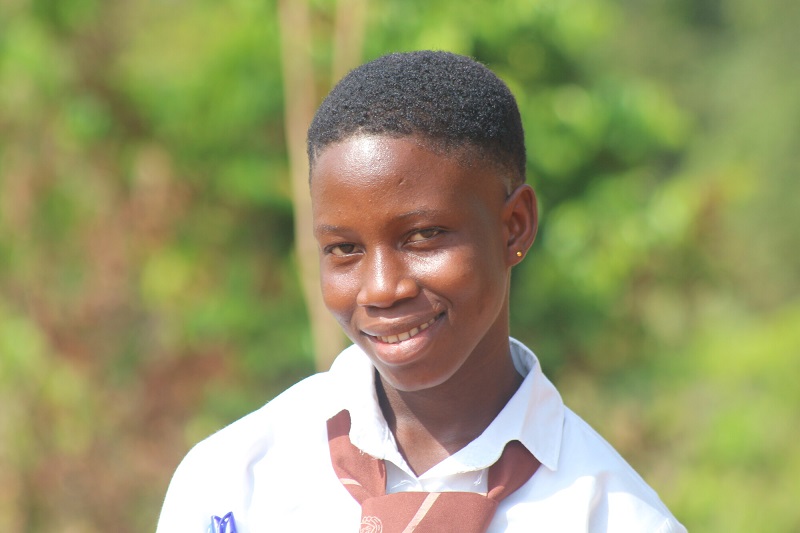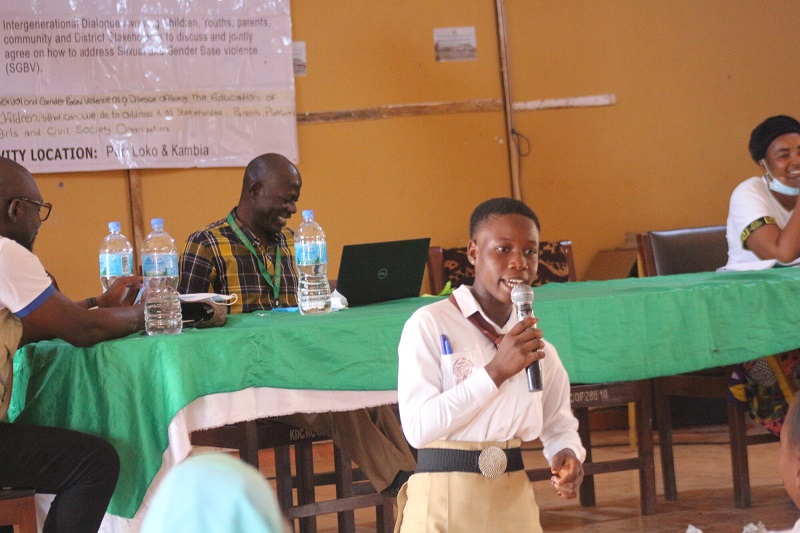
“I became a child advocate in my community,” says Namina, who survived
sexual harassment at the hands of a teacher – then used her experience to help others.
Namina, 15, remembers when
she first noticed her teacher paying special attention to her.
“He was very nice to me, smiling at me
all the time,” she says. “Sometimes he touched me on my shoulder, but I was not
quick to judge what his intentions were.” After all, this teacher was an
important man, a respected member of the government council in their small
community in Kambia District, Sierra Leone.
Then,
one day, the teacher called Namina to tell her how intelligent she was. He even
offered to pay for her school fees from that point on. He had just one condition:
that she move to the school’s boarding facility, where he himself lived.
“I
welcomed the idea of him sponsoring me, but I had issues with going to stay at the
boarding facility because the school is just a stone’s throw from my house,” Namina
says. “I questioned why he wanted me to go there where he was also staying. I talked
to my parents, and they agreed with me.” But when Namina gave him her answer,
everything changed.
“He immediately declined to sponsor me,”
Namina remembers. “He hated me and called me an unserious girl. He stopped
smiling and encouraging me. At that point, anything I did was nonsense in his
eyes.” The teacher subjected her to floggings – a kind of corporal punishment common in Sierra Leonean schools –
repeatedly, for even minor infractions. Almost overnight, Namina went from being
one of the highest-ranking students in his class to completely failing the
subject. “It was painful,” she says. “I did not know what to do.”
Preventing sexual harassment at school
What Namina experienced was
no fault of her own. She was a victim of sexual harassment. Without her parents’
support, she may have even become a victim of sexual abuse.
School violence of any kind can have serious
effects on children’s psychological and physical health, but school-related gender-based violence (SRGBV) is especially damaging – and girls
are disproportionately affected. Girls who experience SRGBV at the hands of
a peer, teacher or school official may struggle to articulate what is
happening to them. They may be too scared to file a report or even to tell
someone else about the violence.
Sexual violence in
Sierra Leone is common. And in most rural
communities, children are raised to believe that it is taboo to speak their
minds in the presence of adults. These cultural attitudes contribute to a school
environment where perpetrators of sexual violence against children are often
allowed to walk free.
When a
child feels unsafe at school – and powerless to change the situation – she’s much
more likely to drop out. Fortunately, Namina did not get to that point.
“ChildFund
… came to our communities and started talking to us. They formed a Girls’ Platform,”
she says. The platform, a peer-to-peer education forum that helps girls have
conversations with each other about important issues that affect them, is part of a
joint project by ChildFund and the local nonprofit Development Initiative Program to
help prevent sexual violence in Sierra Leone.
The
project has achieved some significant milestones in Sierra Leone. ChildFund and its
partners have established 20 local social structures, like school clubs and support
groups for moms, that have made it easier for communities to connect on issues of
violence and report them to authorities. They’ve supported 23 victims of sexual and
gender-based violence with survivor-centered services, along with other girls and
women affected by issues like child marriage and teen pregnancy. And they’ve helped
400 girls, both in and out of school, organize themselves into the Girls’ Platforms,
where girls are learning how to protect themselves and others from violence.
When Namina learned about
sexual and gender-based violence and how to report it, she quickly recognized the
situation with her teacher for what it was. She decided that she would never again
be silent on these issues.
'A no-nonsense girl': Stopping sexual harassment at school
“I started with the man who
was sexually harassing me,” she says, reporting his behavior on up the authority
chain, or “referral pathway,” she had learned about: first to the mothers’ support
group in her community, then on to the Family Services Unit of the Sierra Leone
Police (FSU).
“One
day at school, I got a phone and went to him,” Namina says. “I called the FSU and
put the phone on loudspeaker.” Her message was loud and clear. “He begged for
forgiveness,” she says.
The
teacher was warned by the police and school authorities that should he harass a
student again, legal action would be taken against him. He resigned from his
positions at the school and in the local government shortly after.
Namina
says that her own experiences have empowered her to speak up for other children who
experience gender-based violence.
“Recently,
I helped a girl who was about to be sexually abused by an elderly male,” she says.
“I forced my way into the room and disrupted that act of wickedness that was about
to be unleashed on an innocent girl.”
And
she’s not afraid to speak up about violence to her elders. During a recent
intergenerational dialogue organized by ChildFund, in which children, teens and
adults all came together to discuss these sensitive issues and talk about solutions,
Namina got the chance to share her story and urge adults to take action for
children’s well-being.
“These
dialogues are helping me to be bold and fearless,” Namina says. “Now I have the
courage and confidence to speak among elders. Now, I am a no-nonsense girl when it
comes to reporting issues of abuse.”






